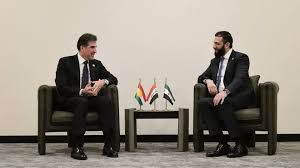In a previously unannounced diplomatic encounter, Syrian President Ahmad Al-Sharaa met with Nechirvan Barzani, President of Iraq’s Kurdistan Region, on the sidelines of the Antalya Diplomacy Forum in Turkey. The surprise meeting carried significant implications, particularly due to its timing and location in a region characterised by volatility and rapidly evolving power dynamics.
The choice of venue—Antalya, within the context of an international diplomatic forum—conveyed symbolic political weight beyond mere protocol. Turkey, which holds complex dossiers with both Damascus and Erbil, now appears to be emerging as an unexpected nexus for adversaries seeking practical solutions to entrenched regional challenges. The encounter signalled a growing openness among regional actors to explore new frameworks of political dialogue outside traditional channels.
The meeting reflected a shared willingness by both Damascus and Erbil to recalibrate their bilateral relations and open direct lines of communication. This is particularly timely given the breadth of common concerns requiring cooperation—chief among them border management, security coordination, counterterrorism, and the return of Syrian refugees residing in the Kurdistan Region.
Cooperation Files on the Table
Commenting on the meeting, Hoshyar Malo, head of the Kurdistan Human Rights Monitoring Organisation, told 963+ that the encounter between Presidents Al-Sharaa and Barzani carried substantial political significance, especially in light of the historical and geographical ties between the two sides.
Malo noted that one of the key points of consensus was the shared commitment to combating terrorism—particularly threats posed by the so-called Islamic State (ISIS). The dialogue also addressed the future of Syria’s Kurdish population and their role in the political process, with discussions highlighting the need to guarantee cultural, political, and social rights. This shift signals growing recognition of the importance of fully integrating the Kurdish community into Syria’s national framework.
Another major point of discussion was the situation of the estimated 250,000 Syrian refugees living in the Kurdistan Region. Both sides explored mechanisms to ensure their safe and voluntary return, with dignity and in conditions conducive to long-term stability for both Syria and the Region.
Economic cooperation was also on the agenda, particularly trade through longstanding cross-border routes. These commercial channels have historically underpinned economic interaction between Erbil and Syrian territories and remain vital to economic recovery and regional stability.
Damascus’s New Direction in the Background
Since assuming office, President Al-Sharaa has sought to rebuild Syria’s regional relations and overcome the isolation stemming from years of conflict. His meeting with Barzani appears to be a key element of this broader diplomatic push, which prioritises political engagement with neighbouring powers.
Political analyst Muayyad Ghazlan told 963+ that the meeting constituted an important milestone in promoting regional stability and the fight against terrorism. He suggested that the Kurdistan Region could act as a political guarantor for any future agreement between Damascus and the Syrian Democratic Forces (SDF)—a potential breakthrough in Syria’s political and security landscape.
Ghazlan added that by supporting Damascus’s counterterrorism efforts, the Region could facilitate the expansion of state authority in former ISIS-held areas, help stabilise border zones, and curtail Iranian influence. He further noted that stronger economic ties between Erbil and Damascus could catalyse Syria’s post-war recovery.
Border security remains a top priority for both sides, amid ongoing challenges such as arms smuggling and militant infiltration. Turkish President Recep Tayyip Erdoğan’s remarks at the forum, which linked Turkey’s national security to Syria’s, underscored the broader significance of this trilateral moment of indirect engagement made possible by the Antalya platform.
Between Cautious Optimism and Future Ambitions
The meeting between Sharaa and Barzani was far more than a diplomatic formality; it is widely seen as a foundational step towards a new trajectory of dialogue between Damascus and Erbil—with potential implications beyond. Political commentator Kifah Mahmoud told 963+ that the Kurdish and Syrian peoples share deep historical ties, and that the Region’s engagement reflects a clear interest in developments in Syria and support for its new leadership.
Mahmoud noted that the Region’s previous support for the Syrian revolution and democratic aspirations could form the basis for a strategic relationship founded on pluralism and open dialogue. He added that the Region might also serve as a mediator between Damascus and the Autonomous Administration in northeastern Syria, as well as in Turkey’s efforts to resolve its conflict with the Kurdistan Workers’ Party (PKK).
Fuad Aliko, a senior official in the Kurdish Yekiti Party, said the meeting served the mutual interests of both parties, given their shared borders and economic interdependence. He emphasised the potential of the Kurdistan Region to bridge the divide between Damascus and Syria’s Kurdish political forces, whether through the Kurdish National Council or via Barzani’s links to SDF commander Mazloum Abdi.
Aliko added that warming ties between Damascus and Erbil could pave the way for a comprehensive resolution to the Kurdish question in Syria—especially given growing indications of political readiness for direct negotiations and a sustainable long-term settlement.
Amid the region’s rapid transformations and the urgent need for pragmatic political solutions, the meeting between Presidents Sharaa and Barzani in Antalya may well mark the beginning of a new regional dynamic. Observers suggest it could become the nucleus of a broader shift—anchored not in conflict, but in dialogue, diplomacy, and mutual recognition.
 Eurasia Press & News
Eurasia Press & News



